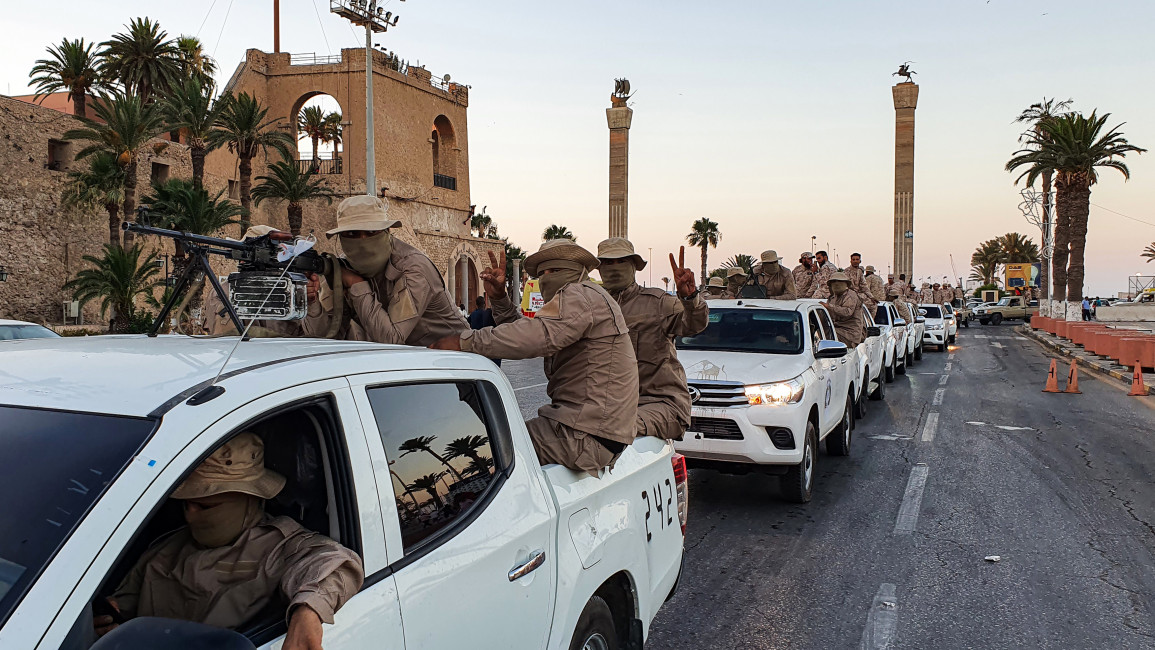Clashes escalate in Tripoli between forces allied to Libya PM rivals
Heavy fighting overnight in Tripoli turned the Libyan capital into a battleground on Saturday morning, as fears of a return to all-out conflict loom.
Residents reported heavy artillery shelling in the centre of the city throughout the night, while military sources told local media that intense clashes had taken place around government buildings and strategic positions.
At least two people were killed in armed clashes in Tripoli, Arabic-language media reported.
Phone footage on social media shows civilians taking shelter in Tripoli’s streets while firefights between rival militias destroy residential buildings and cars just metres away.
#فيديو: أشتباكات بالأسلحة المتوسطة والثقيلة في شارع النصر #طرابلس #ليبيا pic.twitter.com/Elk5St4t7v
— ليبيا لحظة بلحظة (@3dhzn) August 27, 2022
Earlier in the night, militias allied with the Government of National Unity closed roads near Zliten, 160 kilometres east of Tripoli, to stop more forces loyal to Fathi Bashagha from reaching the capital.
Forces allied with the GNU have also focussed their defence positions on Tripoli’s international airport according to local sources.
Bashagha’s militias, including the 777 Brigade, tried to enter Tripoli from neighbouring Zawiyah and elsewhere on Friday after the former interior minister repeatedly threatened armed escalation.
من سيعوض هؤلاء الناس في ارزاقهم اللي خسروها
— Zaineb Alhamdi (@Zizo123a) August 27, 2022
طرابلس ليلة البارحه مزال الوضع مايطمنش
هيثم التاجوري يامليشياوي pic.twitter.com/heQUqdp5W6
A long-running political crisis in Libya deepened in February when the eastern-based parliament picked Bashagha to replace the government of Dbeibah.
Dbeibah has on numerous occasions refused to hand over power until elections are held.
Elections were meant to be held last December, but fell through amid disagreements over rules and regulations, among other issues.
Bashagha on Tuesday called on Dbeibah to step down as prime minister, and last week repeated his long-standing threat of entering Tripoli by force to seize power.
Calls for restraint and de-escalation from Libyan civil society and international actors this week fell on deaf ears, as military factions massed around the city throughout the week.
US Ambassador to Libya Richard Norland met with representatives of the eastern-based parliament on Friday, where they discussed "maintaining calm until Libyans choose their leadership through elections", according to a statement.
He also met with eastern-based Presidential Council leader Mohamed al-Menfi, discussing "the importance of avoiding violent clashes in #Tripoli and the need for de-escalation".
Libyans on social media decried the rise in violence.
"Tripoli moves into high alert as two illegitimate Prime Ministers that were nominally appointed to deliver elections prepare to start a war to ensure they can hold high office unchallenged…" tweeted Libyan researcher Tarek Megrisi.



